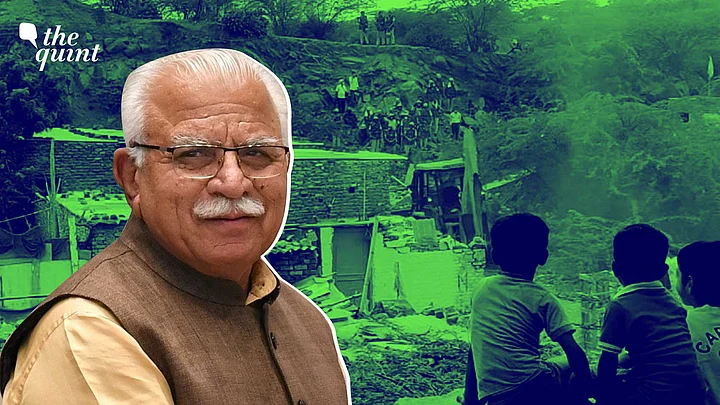On Thursday, 15 July, the Faridabad Municipal Corporation (FMC) razed to the ground several houses as part of the final phase of its demolition drive in Khori Village. The move came after a Supreme Court order from June, which held that the village is an encroachment on the Aravali Forest land.
After several months of protests by villagers, activists, and labourer unions, the Faridabad civic body on 14 July presented a draft rehabilitation policy for residents of this village.
The villagers, however, called the policy an 'eyewash', stating that it excludes approximately 95 percent of those who are being displaced.
The Quint accessed a copy of the draft policy titled 'Policy for Rehabilitation of Khori Jhuggi Dwellers' and found that while the Municipal Corporation has proposed allotment of EWS flats in Faridabad's Dabua Colony and Bapu Nagar, to residents of Khori, several caveats apply.
What Does the Draft Policy Promise?
The draft policy, in line with the Narendra Modi government's 'Housing for All' scheme, promises allotment of EWS flats to residents of Khori Jhuggi cluster with an annual income of up to Rs 3 lakh.
For a family to be eligible for rehabilitation, its adult earning member should fulfil any of the following requirements:
The name of the head of the family must be registered in the voter list under Badhkal Assembly constituency as on 1 January 2021.
The head of the family must have an identity card issued by the Haryana government as on 1 January 2021.
A member of the family must have an electricity connection issued by Haryana's power distribution company Dakshin Haryana Bijli Vitran Nigam.
Only if a family fulfils one of the above conditions, it will be allotted a flat with a carpet area of 30 square metres.
But What About Those Left Out?
Rekha Chaurasia, a social activist and resident of Khori Village whose house was razed on 15 July, told The Quint that the draft policy excludes approximately 95 percent of Khori's affected population.
"The area I live in has several families, including mine, members of which are registered as voters in Delhi. Their electricity and water connections are provided by the Delhi government. So, where do we go now? Our houses are gone, with no potential solution in sight."Rekha Chaurasia, Social Activist and Khori Village Resident
Further, there are several residents in the village who do not have verified IDs of either Delhi or Haryana. "While government officials charged huge sums of money when we were building our houses, they created hurdles when we wanted residential and ID proofs. So, many people here do not have documents to prove that they are residents of either Delhi or Haryana," Chaurasia added.
EWS Flats in Dabua Colony, Bapu Nagar Not Habitable Yet
The Faridabad Municipal Corporation has proposed to pay a sum total of Rs 2,000 per month to residents eligible for rehabilitation till houses in Dabua Colony and Bapu Nagar are ready for them to move in.
This has become a cause of concern for several residents who have been rendered homeless and have no place they can go to.
Dharmendar, a resident of Khori Village, told The Quint,
"Why did the government raze our homes when the alternate facility wasn't even ready?"
Chaurasia adds that to find housing in the middle of a pandemic for an entire family with a paltry income of Rs 2,000 per month is a task which is next to impossible. "Basically, they have forced us to live on the streets," he added.
(At The Quint, we question everything. Play an active role in shaping our journalism by becoming a member today.)
